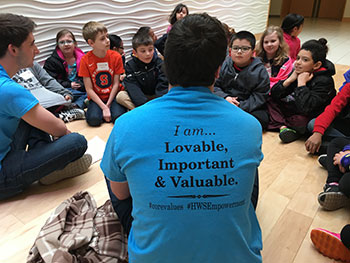Career and CollegeReady

When organizations analyze the goals of Geneva 2030, and align existing programming or potentially create new opportunities, we can begin to guide our students toward success in school and into career preparedness. Through her role as president of the Public Education Network, HWS alumna Wendy Purifoy met with the Geneva 2030 steering committee and shared how intervention during specific times in a child's life helps them imagine what the future could hold for them. This data informed the inception of the 'Geneva 2030 College Bound' campus visits at HWS, and the attention on programming ranging from literacy for second graders to STEAM for sixth graders and college admissions process for ninth graders. We are proud to welcome more than 500 students from West Street Elementary, Geneva Middle and Geneva High School to campus annually.
In collaboration with GHS Guidance Counselors, our goal is to expand college and career pathways to expand economic opportunity for all young people in Geneva. To help maximize cradle-to-career success opportunities, Geneva 2030 facilitates collaboration across sectors to develop career awareness, training and mentorship opportunities, and provide entrepreneurial support and business knowledge to families. For students considering entering college after high school, we provide support in the completion of FAFSA forms, we fund pre-college counseling interns who work with our high school students, and we prepare and help distribute resources to assist seniors in preparing for college. We additionally host college visits to the HWS campus for every second, sixth, and ninth grader each year, to support early and ongoing awareness of the educational opportunities available following high school graduation.
In its report titled Building Blocks for Change: What it Means to be Career Ready, the Career Readiness Partner Council defines career and college readiness as the following:
"For too many years, high school graduates throughout the United States faced a fork in the road. One path led to a four-year college, the other to an entry-level job. Some students chose for themselves, while others were tracked based on aptitude and, all too often, on race and income. In today's 21st century global economy, the choices are much more complex and interconnected, and the fork in the road has been replaced by numerous paths, all of which require a rigorous and rich high school experience that prepares all students-not just some-for college and a career."
Additional Information
Our Challenge: Graduating Students College and Career Ready by John B. King, Jr., a presentation given in June, 2012 at EngageNY
The American Diploma Project Network
Achieve launched the American Diploma Project (ADP) Network in 2005, with the goal of making college and career readiness a priority within the United States. An annual report, Closing the Expectations Gap, is published yearly depicting states' progression toward the alignment of high school standards, graduation requirements, and assessment and accountability systems with the demands of college and careers. To learn more, visit the Achieve and the American Diploma Project Network website.
Pathways to College Network
The Institute of Higher Education Policy (IHEP), a Washington, D.C., nonprofit organization, launched the Pathways to College Network in 2001. The Network is a national organization promoting partnership and collaboration among community, education institutions and leaders, and policymakers with an emphasis on evidence-based policies and practices for alignment across middle school, high school, and higher education. The overarching goal is to improve college accessibly and post-secondary success of undeserved students, including first generation college students, minorities, students with disabilities, and low-income students. Pathways promotes the use of research-based policies and practices, the development of new research that is both rigorous and actionable, and the alignment of efforts across middle school, high school, and higher education in order to promote college access and success for underserved students.
